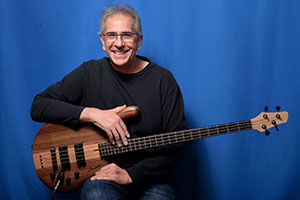Not because it’s not true, but because of how it may be interpreted
By Jon Liebman
February 25, 2022
Regardless of how long you’ve been playing bass, you’ve probably heard comments like, “Oh, bass must be so easy. It’s only got 4 strings. How hard can it be?”
I suppose it’s logical in most people’s minds to think that playing one note at a time on a bass has got to be easier than playing a whole bunch of notes on a guitar or a piano.
I don’t need to tell you, there’s more to it than that.
The reason I’m thinking about all that is because of a conversation I had a couple weeks ago with Eyvind Axelsen, a Norweigian bass player in a band called Diskord.
When I asked him what advice he had for someone who wants to learn bass, he said something I’ve always been very careful to avoid saying.
Learning bass might be easy, but…
“The first thing I would say,” Eyvind told me, “is, ‘Just do it,’ because bass guitar is actually an instrument where it is easy to get started. You can sound relatively competent on bass with a relatively small amount of time devoted to it.”
Well, I suppose on one level that’s sort of true. Those kinds of statements make me uneasy, though, not because they’re not true, but because of how they’ll likely be interpreted. I’m always very careful not to mislead any students, or prospective students, by telling them to learn bass because it’s easy.
“You can sound good doing the easy stuff with bass,” Eyvind says, “and then, when you’ve done that, there are endless possibilities to improve and to learn new stuff. But the basics are easy on bass, and I think that’s good for beginners.”
Don’t dismiss the simple stuff
Okay, that’s correct from a technical standpoint. But what about from an artistic standpoint? A musical standpoint?
You know you need to play the root of the chord on the downbeat of the bar, but how well are you playing that note? Is it perfectly in time? Is it totally in sync with the drummer? How about the volume, the attack, the release, intonation, and overall musicality?
Then there’s the ubiquitous “1-5” pattern. You may have heard me talk about this before. I’m very critical of bass players who dismiss the 1-5 pattern, saying, “Oh, that’s just 1-5; it’s no big deal.” It is a big deal. When you play a 1-5 pattern – and as a bass player, you’ll play it a lot! – give the music the best 1-5 you’ve got!
In the same spirit, I often find myself citing Freddie Green, legendary guitar player for the Count Basie big band. Freddie almost never took a solo. Freddie’s primary contribution to the band – and to the music – was to plunk down chords on “two” and “four” of every bar. That’s over 90% of what he did. And he did it better than anyone.
“If you want to play simple stuff and have fun, ”Eyvind says, “just do it, and don’t worry about being this or that good, or playing fast or whatever.”
Every note is important
Yes, obviously you’re best off starting with simple lines, patterns, grooves, etc., before moving up to more challenging stuff. Just don’t dismiss the easy stuff just because you don’t find it technically difficult to play.
Every note matters. Making the song sound good matters. As you move across the spectrum of learning bass, you always need to give the music everything you’ve got, no matter how accomplished you become. Even when you’re playing the “easy” stuff.
What about you? Have a thought on the subject? Leave a comment below and let me know what you think. In the meantime, watch my interview with Eyvind here.






Jon I agree with what you say, “You know you need to play the root of the chord on the downbeat of the bar, but how well are you playing that note? Is it perfectly in time? Is it totally in sync with the drummer? How about the volume, the attack, the release, intonation, and overall musicality?” This is exactly what I’m currently working on – I’ve gone back to playing easy notes, really beginner level stuff, but focusing on technique, tone and timing. I’m currently working on your “Easy” course and I can say I’m actually not finding it ‘easy’ because now I’m more advanced I can hear when I’m out of time or my notes aren’t the correct length etc. and I’m working my fingers till they ache just trying to get the simple stuff ‘perfect’.
Great work, Celia. Thanks for letting me know. I admire your ambition, but… be kind to your fingers! 🙂
Hey, Jon. This blog post plays nicely with a couple videos I watched on your channel in the past few days: “Find Your One Note” and “How to Play it Clean.” I just discovered your content on Thursday or Friday. It’s late Sunday afternoon as I type this, and I’ve already watched close to 50 videos. I’ve checked out a lot of online bass instructors, and you are the first one who I’ve felt totally aligned with. Your style is exactly what I’ve been looking for. It doesn’t hurt that you and I are of a similar vintage, and we’re both from Michigan. Glad I found you! I will be joining The Bottom Line Club.
Hey, John! Thanks so much for your kind words. Glad to have you in the “For Bass Players Only” community!